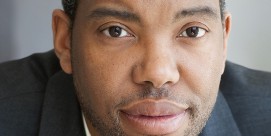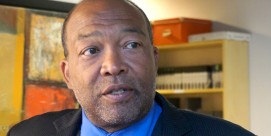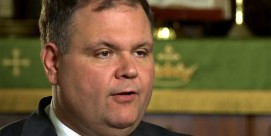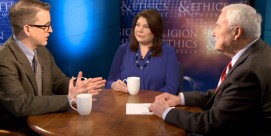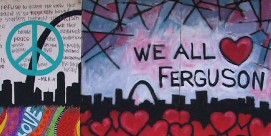America’s Evangelicals
Poll: America’s Evangelicals More and More Mainstream But Insecure
Diversity, Differences Mark Their Views on Society, Culture, Politics
Washington, DC – Three-quarters of all evangelicals say they feel part of mainstream American society, but three-quarters of all evangelicals also believe they are a minority under siege and must fight for their voices to be heard. A March 2004 poll by Greenberg Quinlan Rosner Research Inc. for RELIGION & ETHICS NEWSWEEKLY and U.S. NEWS & WORLD REPORT shows that America’s evangelicals are comfortable with society around them, but not completely so, and their social and political views are notably diverse.
While a strong majority of white evangelicals oppose gay marriage (84%) and civil unions (73%), most evangelicals (52%) say they would prefer to rely on state law to prohibit gay marriage rather than amend the U.S. Constitution. Less than half of white evangelicals (48%) say that a candidate’s support for gay marriage would disqualify him or her from getting their votes.
There are important differences among black, white and Hispanic evangelicals on political and moral questions. About 69% of white evangelicals say they are Republicans or lean Republican, while 84% of African American evangelicals identify themselves as Democrats or lean Democrat. Roughly one-in-five likely white evangelical voters (23%) say they are Democrats or lean Democrat.
The media often look to Pat Robertson and Jerry Falwell to speak on behalf of all evangelicals, yet evangelicals give Falwell a marginally unfavorable rating (average rating 44 out of a possible 100), and Robertson receives only a marginally favorable rating (55 out of a possible 100). In contrast, evangelical leaders Franklin Graham and James Dobson are both viewed very favorably by evangelicals (73 out of a possible 100), and Pope John Paul II is viewed more favorably by all evangelicals (59 out of a possible 100) than either Falwell or Robertson.
Contrary to popular assumptions, not all American evangelicals attend mega-churches. Only 14% belong to congregations that are larger than 1000 members, the same as non-evangelical Protestants, and almost one-in-five evangelicals (19%) attend a church with less than 100 members.
Part 1: Evangelicals and Identity
Part 2: Evangelicals and Politics
Part 3: Evangelicals and Culture
Part 4: Evangelicals and Evangelism
There are notable discrepancies between how evangelicals think members of the wider society view them, how they view themselves, and how society says it views evangelicals. A strong majority (72%) of all evangelicals feel the mass media are hostile to their moral and spiritual values. Almost half (48%) believe that evangelical Christians are looked down upon by most Americans. And 75% of all evangelicals say they must fight to make their voices heard. In contrast, less than half (46%) of non-evangelicals think evangelicals must fight to be heard, and only 35% of non-evangelicals think Americans looks down on evangelicals.
Despite their involvement in international issues such as human rights and religious freedom, evangelicals rank military strength (40%), controlling weapons of mass destruction (34%) and fighting terrorism (30%) as significantly more important than relief efforts (14%) or helping to improve the standard of living in less developed countries (9%).
While white evangelicals are almost evenly divided among themselves over whether the country is going in the right direction (44%) or is on the wrong track (45%), all African Americans say overwhelmingly (81%) that the country has gotten off on the wrong track. There is much more agreement among evangelicals and the country as a whole when asked whether moral values are on the wrong track. More than three-quarters of white evangelicals, 94% of African American evangelicals, 87% of all African Americans, 74% of all Hispanics, and 71% of all Americans think moral values are seriously on the wrong track.
An overwhelming majority of all evangelicals (84%) believe that personal faith in Jesus Christ is the only way to salvation, compared with 38% of Catholics and 56% of non-evangelical Protestants. Just half of white evangelicals, however, believe that only born-again Christians go to heaven, and even fewer black evangelicals (42%) say they believe only born-again Christians will go to heaven.
Only white evangelicals put moral values first among their domestic concerns. More than a third of white evangelicals (37%) say moral values are of most concern, while only 16% of all African Americans and 13% of all Hispanics say that moral values worry them most. Forty-one percent of all African Americans and 34% of all Hispanics worry most about the economy and jobs, but among white evangelicals the number is 25%. Yet on many other domestic pocketbook issues such as health care and Social Security, the level of concern among white evangelicals is very similar to that of all other Americans.
By evangelical the survey means EITHER respondents who indicated that they are Protestant or another Christian religious preference other than Roman Catholic, Orthodox or Mormon and who indicated they would say they are a fundamentalist, evangelical, charismatic or Pentecostal Protestant OR respondents who indicated that they are Protestant or another Christian religious preference other than Roman Catholic, Orthodox or Mormon who do not consider themselves liberal or mainline and call themselves a born-again Christian. This is not the only definition of evangelical, of course, but it does define the core of the evangelical community.
The nationwide survey of 1610 adults, with over-samples of white evangelicals, African Americans, and Hispanics, was conducted March 16 – April 4, 2004 and has a margin of error of plus or minus 2.5%. Additional analysis was provided by John Green, professor of political science and director of the Ray C. Bliss Institute of Applied Politics at the University of Akron, and Robert Wuthnow, professor of sociology and director of the Center for the Study of Religion at Princeton University.
AMERICAN EVANGELICALISM: EMBATTLED AND THRIVING by Christian Smith
CHRISTIAN AMERICA? WHAT EVANGELICALS REALLY WANT by Christian Smith
DIVIDED BY FAITH: EVANGELICAL RELIGION AND THE PROBLEM OF RACE IN AMERICA by Michael Emerson and Christian Smith
EVANGELICALISM: THE NEXT GENERATION by James M. Penning and Corwin E. Smidt
HEAVEN BELOW: EARLY PENTECOSTALS AND AMERICAN CULTURE by Grant Wacker
WHERE SHALL MY WOND’RING SOUL BEGIN? THE LANDSCAPE OF EVANGELICAL PIETY AND THOUGHT edited by Mark Noll and Ronald Thiemann
WONDERFUL WORDS OF LIFE: HYMNS IN AMERICAN PROTESTANT HISTORY & THEOLOGY edited by Richard Mouw and Mark Noll
THE SCANDAL OF THE EVANGELICAL MIND by Mark Noll
BLESSED ASSURANCE: A HISTORY OF EVANGELICALISM IN AMERICA by Randall Balmer
WITH GOD ON OUR SIDE: THE RISE OF THE RELIGIOUS RIGHT IN AMERICA by William Martin
PIETY AND POLITICS edited by Richard John Neuhaus and Michael Cromartie
SHAKING THE WORLD FOR JESUS: MEDIA AND CONSERVATIVE EVANGELICAL CULTURE by Heather Hendershot
LATINO PENTECOSTAL IDENTITY: EVANGELICAL FAITH, SELF AND SOCIETY by Arlene Sanchez Walsh
ONE FAITH: THE EVANGELICAL CONSENSUS by J.I. Packer and Thomas C. Oden
A PUBLIC FAITH: EVANGELICALS AND CIVIC ENGAGEMENT edited by Michael Cromartie
PILGRIMS ON THE SAWDUST TRAIL: EVANGELICAL ECUMENISM AND THE QUEST FOR CHRISTIAN IDENTITY edited by Timothy George
THE RISE OF EVANGELICALISM by Mark A. Noll
BIOGRAPHICAL DICTIONARY OF EVANGELICALS edited by Timothy Larsen et al.
ENCYCLOPEDIA OF EVANGELICALISM by Randall Balmer
ONE NATION UNDER GOD: CHRISTIAN FAITH AND POLITICAL ACTION IN AMERICA by Mark A. Noll
RELIGION AND AMERICAN POLITICS: FROM THE COLONIAL PERIOD TO THE 1980s edited by Mark A. Noll
THE VARIETY OF AMERICAN EVANGELICALISM edited by Donald Dayton and Robert Johnston
FUNDAMENTALISM AND EVANGELICALISM by Nathan Hatch
THE SMELL OF SAWDUST: WHAT EVANGELICALS CAN LEARN FROM THE FUNDAMENTALIST HERITAGE by Richard J. Mouw
GOD’S DAUGHTERS: EVANGELICAL WOMEN AND THE POWER OF SUBMISSION by R. Marie Griffith
GOD’S MAN FOR THE GILDED AGE: D.L. MOODY AND THE RISE OF MASS EVANGELISM by Bruce Evensen
EVANGELICAL THEOLOGY: AN INTRODUCTION by Karl Barth
THE YOUNGER EVANGELICALS by Robert E. Webber

